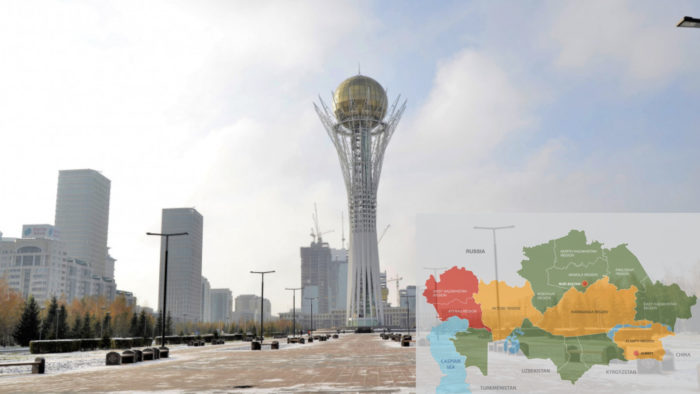NUR-SULTAN – The number of coronavirus cases has increased 12 percent over the past a week as a result of the easing of the restrictions has led to more cases, said Kazakhstan’s Vice Healthcare Minister and Chief Sanitary Doctor Yerlan Kiyasov at a press briefing on March 25.

The Capital city Nur-Sultan, Almaty, Atyrau and West Kazakhstan regions are in the red zone. Aktobe, Almaty and Karaganda regions are in the yellow zone. All other regions remain in the green zone, while Kazakhstan has moved from the green to the yellow moderate risk zone.
“The general easing of restrictive measures has resulted in the rise in the incidence with the highest number of cases in Almaty and Nur-Sultan, where restrictive measures have been imposed based on the epidemiological situation,” said Kiyasov.
The nation’s two biggest cities Almaty and Nur-Sultan continue to see the growing number of cases since the beginning of March and with the March 8 and Nauryz holidays straining the situation.
Over the past day, Kazakhstan reported 1,100 new cases, 330 of them are in Almaty and 185 are in Nur-Sultan.
But unlike last year, when the lockdown was introduced nationwide, currently, regions and cities have the authority to introduce the restrictions independently as the epidemiological situation may vary.
To address soaring cases, Almaty officials introduced a lockdown on holidays that came into effect March 21 and will last through March 28.
The authorities closed dining places allowing only take out and delivery, trade malls and centres, beauty salons, cosmetology clinics and gyms as well as cut public transport hours.
In Nur-Sultan, where the number of cases increased 76 percent compared to the previous week, according to the city officials, cinemas, movie rooms, swimming pools and gyms suspended their work. Working hours for dining establishments were restricted.
The rule does not apply to the businesses that participate in the Ashyq pilot project. The initiative, which is meant to help businesses work amid the pandemic restrictions, requires citizens to scan a QR code when visiting the venues that display their risk rating based on the PCR testing data provided by the healthcare officials.
Currently, 61 businesses participate in the projects, including 22 fitness centres, 12 spa centres and 16 computer clubs.
“The city has been in the red zone for 17 days based on the epidemiological situation matrix. 150 to 280 cases are registered daily. The incidence rate compared to the past week is 121.1 per 100,000 of the population and the R0 value is 0.92,” said Nur-Sultan’s chief sanitary doctor Sarkhat Beisenova.
The surge in cases is a sign that citizens are not complying with preventive measures, she said.
Transmission of the infection takes place within families and in public places. Cases also continue to be imported from abroad.
According to Kiyasov, since Oct. 6, 2020, when the nation mandated arriving passengers to take a PCR test before departure, more than 322,600 passengers arrived on international flights, and 14 percent of them (44,805) were tested at home and 239 tested positive. Citizens of Kazakhstan who arrive without a PCR test are placed in quarantine, where they get tested for COVID-19.
“Kazakhstan continues the epidemiological monitoring of coronavirus circulation in the country. According to the results of genomic studies conducted from September to January, no new strains of coronavirus – British, South African or Brazilian – were identified in the country. At the end of March, we expect the results of new genomic studies,” said Kiyasov.
Vaccination
Mass vaccination is ongoing in Kazakhstan. More than 107,000 citizens received the first dose, and more than 20,000 of them were fully vaccinated.
The vaccination which started Feb. 1 and first targeted frontline medical workers, now covers teachers, professors, police officers, other medical workers and citizens with chronic conditions.
In April, Kazakhstan plans to start vaccinating citizens over the age of 65.
The nation currently immunises its citizens with the Russian Sputnik V vaccine produced at its Karaganda pharmaceutical plant. Kazakh Prime Minister Askar Mamin and his Russian counterpart Mikhail Mishustin agreed on an additional supply of four million doses during Mamin’s recent visit to Moscow.
In April, the officials also expect the completion of phase 3 clinical trials of Kazakhstan’s QazCovid-in vaccine developed by researchers at the Kazakh Research Institute for Biosafety Problems.

